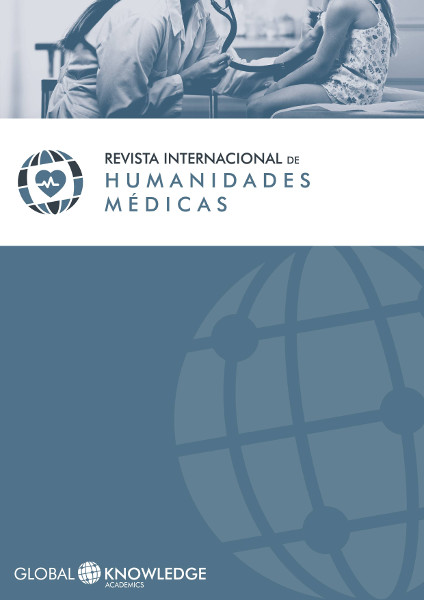El binomio discapacidad-enfermedad: un análisis crítico
DOI:
https://doi.org/10.37467/gka-revmedica.v1.1284Palabras clave:
discapacidad, enfermedad, mirada médica, diversidad funcionalResumen
Enfermedad y discapacidad son dos conceptos vinculados entre sí desde hace mucho tiempo, de manera que la segunda no parece más que una consecuencia de la primera. Aún hoy se tratan ambas como si fueran la misma cosa en multitud de contextos públicos y documentos jurídicos. Pero este vínculo no es tan ineludible como a menudo se da a entender. Según el planteamiento expuesto en este trabajo, son realidades distintas interpretadas como parte de una misma cosa bajo el código de la mirada médica. Este trabajo presenta y analiza de forma crítica el origen arqueológico de la interpretación de la persona con discapacidad como un enfermo crónico dentro del discurso «médico-rehabilitador». Bajo este paradigma se impone a la persona con discapacidad el mandato social de que se rehabilite y/o se cure para, de esta manera, poder reinsertarse y aportar a la sociedad. De lo contrario, quedará condenado a la exclusión.
Estadísticas globales ℹ️
|
206
Visualizaciones
|
85
Descargas
|
|
291
Total
|
|
Citas
Aguado, A., (1995): Historia de las deficiencias , Escuela Libre Editorial, Colección Tesis y Praxis, Madrid.
Águila, L. M., (2007): El concepto de discapacidad y su importancia filosófica. Investigación sobre un aspecto fundamental de la condición humana , Pontificia Universidad Católica del Perú. En web: http://tesis.pucp.edu.pe/tesis/ver/970.
Campos, R., Martínez, J. y Huertas, R. (2000): Los ilegales de la naturaleza. Medicina y degeneracionismo en la España de la Restauración (1876-1923) , Madrid, CSIC.
Canguilhem, G. (1970): Lo normal y lo patológico , S. XXI Argentina Editores, Buenos Aires.
Foucault, M. (1996): Vigilar y castigar: El nacimiento de la prisión , Siglo XXI de España Editores.
Foucault, M. (2007): El Nacimiento de la clínica: Una arqueología de la mirada médica , Siglo XXI de España Editores.
Finkelstein, V. (1980): Attitudes and Disabled People: Issues for Discussion , New York, World Rehabilitation Fund.
Garland, R. (1995): The eye of the beholder Deformity & Disability in the Graeco-Roman world, Duckworth, London.
González, A. (1998): Los sistemas de clasificación de los seres vivos , Madrid, Ed. Akal.
Guzmán, F., Moscoso, M. y Toboso, M. (2010): «Por qué la Ley de Dependencia no constituye un instrumento para la promoción de la autonomía personal», Zerbitzuan, 48: 43-56.
Heidegger, M. (2003): Ser y Tiempo , Madrid, Ed. Trotta.
Hunt, Paul (1966): Stigma: The Experience of Disability , London (UK), Geoffrey Chapman.
López Calera, N. (1994): «La vida y la muerte ante la ética y el derecho, paternalismo médico y desarrollo científico», DOXA. Cuadernos de Filosofía del Derecho , 15, Volumen II.
Oliver, Michael (1990): The Politics of Disablement , London, The Macmillan Press Ltd.
OMS-CIDDM (1997): Clasificación Internacional de Deficiencias Discapacidades y Minusvalías, Instituto de Migraciones y Servicios Sociales, IMSERSO, Madrid.
OMS-CIF (2001): Clasificación Internacional del Funcionamiento, de la Discapacidad y de la Salud, IMSERSO, Madrid.
Palacios, A. y Romañach, J. (2007): El modelo de diversidad , Ediciones Diversitas.
Paré, A. (1993): Monstruos y prodigios , Ediciones Siruela, S.A.
Pimentel, J. (2003): Testigos del mundo. Ciencia, literatura y viajes en la Ilustración, Madrid, Ed. Marcial Pons.
Rodríguez-Picavea, A. (2007): «Reflexiones en torno a la figura del asistente personal para la vida independiente y la promoción de la autonomía de las personas con diversidad funcional (discapacidad)», Zerbitzuan, 41: 115-127. Disponible en web: http://www.siis.net/documentos/zerbitzuan/zerbitzuan41.pdf.
Romañach, J. (2008): Bioética al otro lado del espejo: la visión de las personas con diversidad funcional y el respeto a los derechos humanos. En web: http://www.diversocracia.org/docs/Bioetica_al_otro_lado_del_espejo.pdf.
Romañach, J. y Arnau, M. S. (2004): «Omisiones bioéticas sobre discapacidad», Cuenta y Razón del Pensamiento Actual, 134: 65-72.
Romañach, J. y Lobato, M. (2005): «Diversidad funcional, nuevo término para la lucha por la dignidad en la diversidad del ser humano». Disponible en web: http://www.minusval2000.com/relaciones/vidaIndependiente/diversidad_funcional.html.
Sampedro, R. (2004): Cartas desde el infierno, Editorial Planeta.
Stiker, H. J. (1999): A History of Disability, English translation by William Sayer, The University of Michigan Press.
Toboso, M. y Arnau, M. (2008): «La discapacidad dentro del enfoque de capacidades y funcionamientos de Amartya Sen», Araucaria. Revista Iberoamericana de Filosofía, Política y Humanidades, 20: 64-94.
Vasey, S. (2004): Guía para Autogestionar la Asistencia Personal, Barcelona, Institut Guttman.
Descargas
Publicado
Cómo citar
Número
Sección
Licencia
Aquellos autores/as que publiquen en esta revista, aceptan los términos siguientes:
- Los autores/as conservarán los derechos morales sobre la obra y cederán a la revista los derechos comerciales.
- Transcurrido un año desde su publicación, la versión del editor pasará a estar en acceso abierto en la web de la editorial, pero la revista mantendrá el copyright de la obra.
- En el caso de que los autores deseen asignar una licencia abierta Creative Commons (CC), podrán solicitarla escribiendo a administracion@edulab.es









